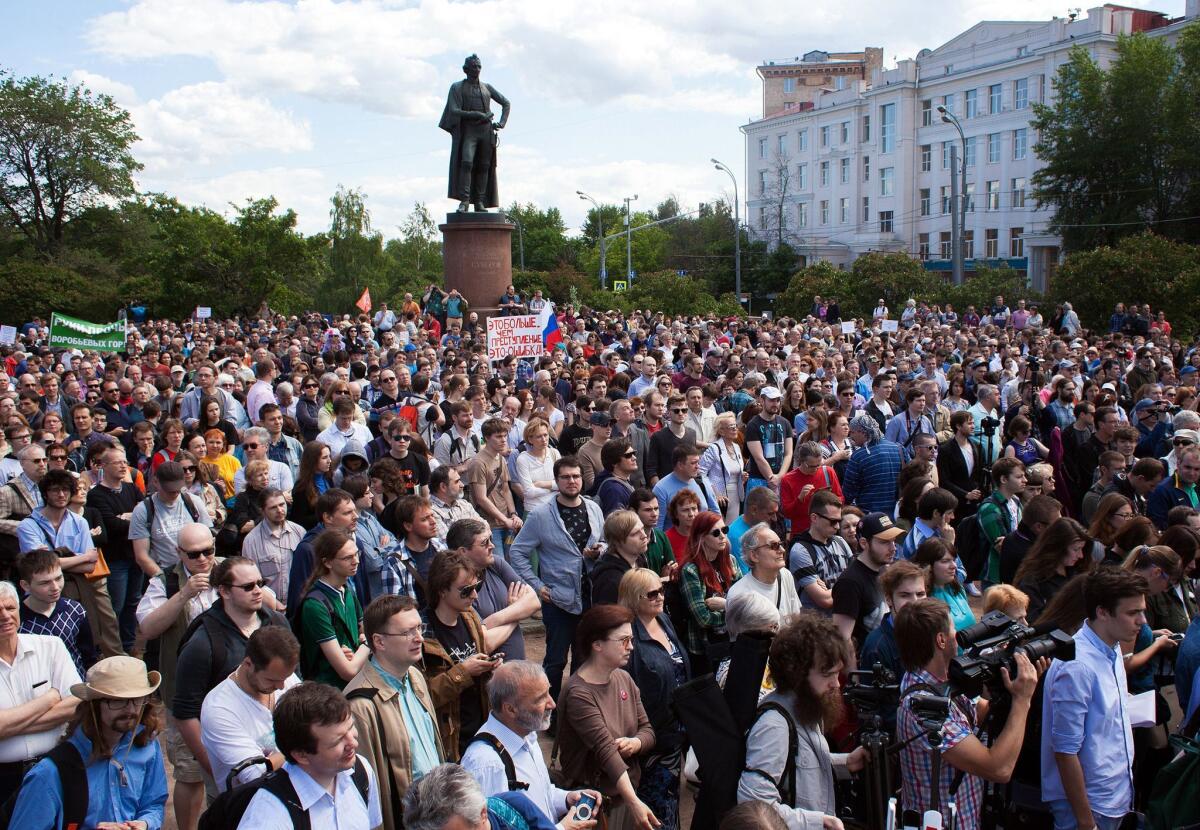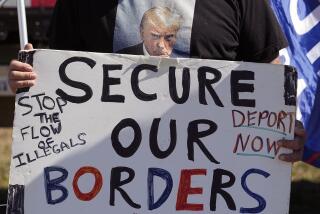Russia brands U.S. democracy-promoting group ‘undesirable’

Hundreds of Russians, many of them scientists, take part in an anti-government demonstration June 6, expressing fear that after the Kremlin crackdown on media, rights activists and political opponents that it is now targeting independent scientific and technology development.
The Russian government on Wednesday formally branded the U.S. National Endowment for Democracy as an “undesirable” operation, a designation that will force the civil society advocates to shut down their offices and cease issuing grants to Russian rights groups.
In a statement carried by the official Tass news agency, the Russian Foreign Ministry accused the democracy-promoting nongovernmental organization of activities “aimed at destabilizing the internal situation in countries that pursue an independent policy.”
The Congress-funded group is the first U.S. operation to be targeted since passage of legislation this summer empowering Russia’s prosecutor general to expel foreign agencies considered a threat to Russian “defense and constitutional order.”
The law enhances Russia’s attempts to deter its citizens from joining foreign-instigated movements to support opposition political activities in a country that has grown increasingly authoritarian since President Vladimir Putin returned to the Kremlin helm in 2012.
An earlier measure passed three years ago required foreign NGOs that distribute funds or significant aid to allied Russian groups to register with the government as “foreign agents.”
“The law on undesirable organizations is the latest in a series of highly restrictive laws that limit the freedom of Russian citizens,” the National Endowment for Democracy said in a statement. “This law, as well as its predecessors, contravenes Russia’s own constitution as well as numerous international laws and treaties.”
The State Department also lashed out at the Russian move to drive the pro-democracy group out of the country.
“We are deeply troubled by Russia’s formal designation of the National Endowment for Democracy as a so-called ‘undesirable’ organization. This designation only heightens our concern that the so-called ‘undesirables’ law will further restrict the work of civil society in Russia,” said the statement issued Tuesday, when the Russian Justice Ministry approved the prosecutor’s claim that the group sought to undermine Russian security. “This action is a further example of the Russian government’s growing crackdown on independent voices and another intentional step to isolate the Russian people from the world.”
The Russian Foreign Ministry statement mocked the U.S. government’s expression of dismay.
“Profound concerns of the U.S. State Department over the future of Russian civil society ... are clearly hypocritical,” the statement said. “It is a nongovernmental organization only on paper. In reality, it has got its money from the U.S. budget, including funds allocated by intelligence bodies, ever since its foundation.”
Other U.S.-based civil society groups have decided to close their Russian operations.
“It is with regret, but with confidence that it is the right decision, that we share the news that the MacArthur Foundation will close its branch office in Moscow,” the independent philanthropic organization said in a statement last week.
It cited the recent legislation as the impetus for its departure, saying the law made it “all but impossible for international foundations to operate effectively and support worthy civil society organizations in that country.”
U.S.-Russian relations have sunk to a post-Cold War low in recent years as Putin and his United Russia party that dominates all political institutions have moved to dilute Western influence in the country and to cast pro-democracy activities as foreign interference in the country’s domestic affairs.
Tension between the former Cold War rivals has been particularly sharp since Russia seized and annexed Ukraine’s Crimean peninsula in March 2014. The Kremlin has sought to justify the action as necessary to protect the region’s predominantly Russian population from what it cast as a U.S.-backed coup against former Ukrainian President Viktor Yanukovich, a staunch Kremlin ally.
Follow @cjwilliamslat for the latest international news 24/7
More to Read
Start your day right
Sign up for Essential California for news, features and recommendations from the L.A. Times and beyond in your inbox six days a week.
You may occasionally receive promotional content from the Los Angeles Times.







